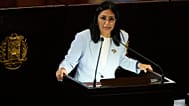BERLIN - Germany's decision to hike defence spending with debt-financed 100 billion euros ($112.7 billion) this year could double its overall 2022 net new borrowing target to more than 200 billion euros, a person familiar with the matter told Reuters on Sunday.
After two years of record net new borrowing and unprecedented state spending to cushion the impact of the COVID-19 pandemic on citizens and companies in Europe's largest economy, Germany was aiming to limit new borrowing close to 100 billion euros this year.
But following Russia's invasion of Ukraine, Chancellor Olaf Scholz's announcement to supply 100 billion euros to a special fund for military investments this year could push net new borrowing close to last year's net debt record of 215 billion euros.
This extra borrowing will "be booked in full in 2022, in addition to the borrowing in the federal budget," Florian Toncar, a senior German finance ministry official, told Reuters.
Budget experts already had doubts that new borrowing could be capped at 100 billion euros even before the war in Ukraine due to planned government aid and tax reduction for companies hit by the pandemic and public spending towards a climate-friendly economy.
The finance ministry has been working to bring the federal budget back in line with currently suspended debt limits from 2023 onwards.
Toncar said the special fund would not affect Germany's borrowing upper limit from 2023.
But Finance Minister Christian Lindner on Sunday said the hike in defence spending will be funded by debt in the coming years, adding that investments in the Bundeswehr should not prompt warnings against new debt.
The German cabinet is due to decide on the 2022 draft budget and medium-term financial planning on March 9.
"A higher level of new debt cannot be ruled out," Lindner's adviser Lars Feld told the Rheinische Post newspaper before Scholz's Sunday announcement.
Clemens Fuest, the head of the Munich-based Ifo Institute, said the Ukraine crisis could justify exceeding the debt limit but additional expenditure should not be financed entirely through debt in the medium term.
($1 = 0.8875 euros)


















